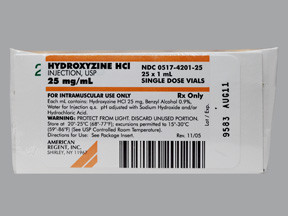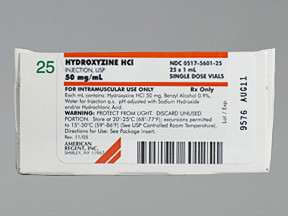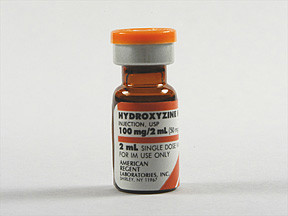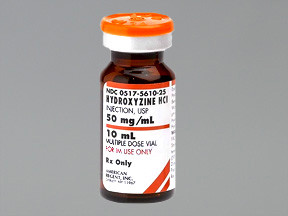HYDROXYZINE - INJECTION
PHONETIC PRONUNCIATION: (hye-DROX-i-zeen)
COMMON BRAND NAME(S): Vistaril
GENERIC NAME(S): hydroxyzine HCl
Uses
USES: Hydroxyzine is used for the short-term treatment of nervousness and tension that may occur with certain mental/mood disorders (e.g., anxiety, dementia). It is also used to help manage withdrawal symptoms (e.g., anxiety, agitation) in alcoholics. Other uses include helping to decrease anxiety and nausea before/after surgery or during childbirth or helping certain narcotic pain relievers (e.g., meperidine) work better. Hydroxyzine belongs to a class of medications called antihistamines. It is thought to work by affecting certain natural substances (acetylcholine, serotonin) in your body or by acting directly on certain parts of the brain. Hydroxyzine also blocks a natural substance that your body makes during an allergic reaction (histamine).
How to use HYDROXYZINE - INJECTION
HOW TO USE: This medication is given by injection into a muscle as directed by your doctor. Dosage is based on your age, weight, medical condition, and response to treatment. If you are giving this medication to yourself at home, learn all preparation and usage instructions from your health care professional. Before using, check this product visually for particles or discoloration. If either is present, do not use the liquid. Learn how to store and discard medical supplies safely.
Side Effects
Precautions
Interactions
Overdose
Images
Reviews
Faq for HYDROXYZINE - INJECTION
Hydroxyzine injection is used to treat severe itching caused by allergies. It can also be used as a sedative before and after general anesthesia.
Hydroxyzine injection works by blocking the effects of histamine, a substance in the body that causes allergic symptoms like itching. It also has sedative properties that help relax and calm patients.
Hydroxyzine injection is given by a healthcare professional through a needle or catheter into a vein. It should not be injected into the muscle.
The common side effects of hydroxyzine injection include drowsiness, dry mouth, dizziness, blurred vision, and headache. Rare but serious side effects may include a racing heartbeat, tremors, and difficulty urinating. Seek immediate medical attention if you experience any severe or persistent side effects.
It is important to consult with your doctor before using hydroxyzine injection during pregnancy or breastfeeding. While it is generally considered safe, your healthcare provider will weigh the potential benefits and risks for you and your baby.
Hydroxyzine injection may be used in children, but the dosage and administration should be determined by a healthcare professional based on the child's age, weight, and medical condition.
Disclaimer
IMPORTANT: HOW TO USE THIS INFORMATION: This is a summary and does NOT have all possible information about this product. This information does not assure that this product is safe, effective, or appropriate for you. This information is not individual medical advice and does not substitute for the advice of your health care professional. Always ask your health care professional for complete information about this product and your specific health needs.




No Reviews Yet